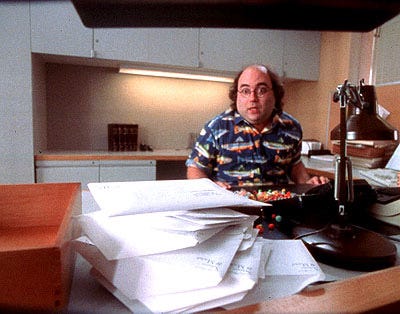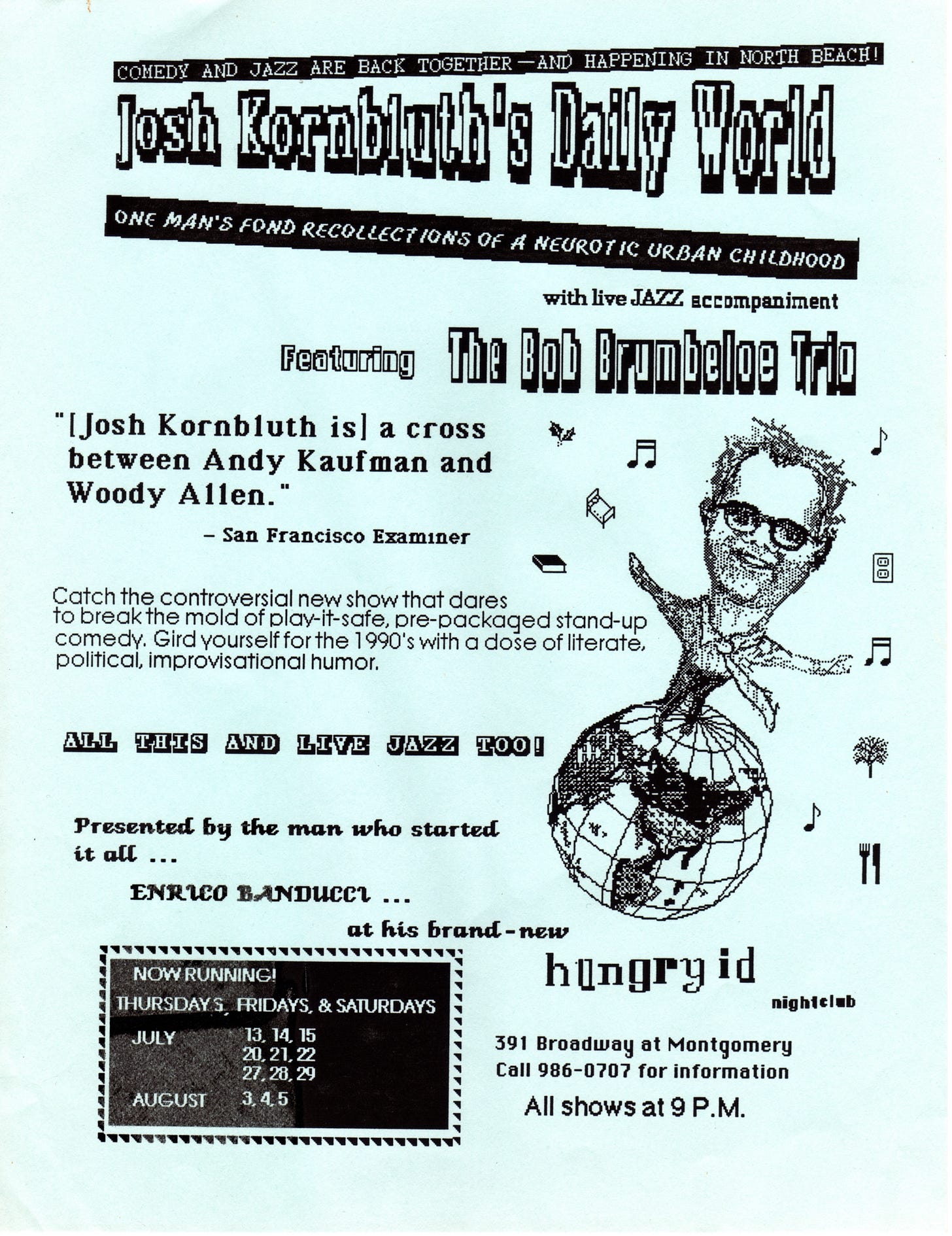How "Haiku Tunnel" Got to Sundance
The first installment in a series about making our Little Indie Film That Could.
In 2000 my brother Jacob and I made a movie called Haiku Tunnel. Amazingly, it got into the 2001 Sundance Film Festival, where it was picked up for distribution by Sony Pictures Classics. This is the first installment in what I plan to be an occasional series of reminiscences about our often chaotic, and frequently joyful, experiences as first-time filmmakers.
Part 1: Swallow the Money
There were some fund-raising pizza parties, and then a very consequential blintz party. But I’m getting ahead of myself. Let’s start at the beginning.
I was a really bad secretary. It was 1990, and I’d just finished the yearlong run of my first-ever autobiographical monologue, Josh Kornbluth’s Daily World (which would later morph into Red Diaper Baby). Daily World had premiered in a basement in San Francisco’s North Beach neighborhood, then moved on to a South of Market dance space, and eventually settled into a nice auditorium in a building on Van Ness Ave., before getting shuttled down to the basement of that building (that rare achievement in showbiz: a basement-to-basement trajectory) — and then into progressively smaller and smaller spaces in that basement, until finally I was performing the show in a literal office that seated about six; I borrowed a boombox from the concessions guy to run my pre-show music and did my own lighting cues (which consisted of turning the light switch off and on at crucial moments). There’s an unwritten rule in the theater world: the audience should have at least as many people as there are in the cast. When it got to the point where I was rarely meeting that threshold for my one-man show, the producer finally pulled the plug (literally).

As I continued at my day job working for a tax lawyer at a big San Francisco law firm that was then called Pillsbury Madison & Sutro (PMS), I began sketching out ideas for my next solo piece, Haiku Tunnel, which I decided to set at a fictional law firm called Schuyler & Mitchell (S&M). In improvs at an indispensable local theater called The Marsh, a plot began to take shape: My character, “Josh,” was a great temp — wherever his temp agency, Uniforce, sent him, he dazzled employers with his impeccable professionalism. The problem was that, whenever his bosses at those places got him to go “perm,” he immediately started messing up. At the start of Haiku Tunnel, Josh’s supervisor, the terrifying head secretary Marlina d’Amore, persuades him to go perm for his boss, the even more terrifying tax attorney Bob Shelby — who Josh believes may in fact be Satan. Sure enough, right after Josh goes perm, he does something terrible: he fails to mail a large number of very important letters for Bob. Josh then goes through an escalating series of crises as he tries to cover up this failure, but only manages to make the situation worse and worse.

Haiku Tunnel ended up having an even longer run than Daily World — and as a bonus, it never had to play in a basement. A couple of years later, after my show Red Diaper Baby had gone to New York and become a hit, Miramax optioned the film rights to Haiku Tunnel and hired me to write the screenplay. After two years, the project went into “turnaround” — which basically meant that the movie-studio folks turned around and walked away. And that, I figured, was that.
And then my younger brother Jacob had an idea. This was now about eight years later. After graduating from Michigan State, driving cross-country without stopping while chain-drinking liter bottles of Mountain Dew, then crashing for roughly six months on the futon in my tiny in-law apartment in the Mission District, Jake had started volunteering as a Production Assistant on various film projects in the Bay Area. He quickly worked his way up the chain of command, eventually reaching the (paid) status of First Assistant Director on several productions. At which point, he told me that he thought he and I could start making our own movies together.

I pointed out that, in the great tradition of the Kornbluth family, we were both broke-ass. Jake agreed that this was a concern. Fortunately, we had a key ally: the Cheese Board Collective in Berkeley. With their donated pizzas, we started holding pizza-party fundraisers for possible investors in the Haiku Tunnel film project. Here’s the good news: Everyone loved the pizzas! The bad news: Very few people ended up deciding to invest. I’d have to say our low point was a fundraiser we held at an art gallery in downtown San Francisco. The big draw to the event (besides the pizza) was that a famous local politician was going to stop by and plug the movie. I won’t reveal the identity of that politician, but his name rhymes with Dilly Crown. Anyhow, he didn’t show up — and we didn’t raise any money that evening, and Jake and I were starting to get a sinking feeling that we’d never have nearly enough financing to make our movie.
And then I got a call from Stephanie Weisman, Artistic Director of The Marsh. One of her board members, she said, might be interested in investing in our Haiku Tunnel film. So Jake and I set up one last fundraiser — and we decided to try a new twist: instead of pizza, this time we’d offer cheese blintzes. A half-hour into this event, not a single prospective investor had shown up — and we grimly faced the prospect of the two of us having to wolf down an ungodly number of blintzes while contemplating our non-future as filmmakers. But then a guy named David (the board member!) ambled in. He looked familiar to me — and indeed, it turned out that David had attended many of my Marsh improvs back in the day. At that time he’d been a scruffy grad student in the Stanford Computer Science Department. But later he’d become a programmer at a software startup that he was sure was going to fail within a year. Nine years later, when that company was bought by Adobe, David suddenly had a non-negligible amount of money.

Jake and I made our well-practiced pitch to David about why he should invest in our Haiku Tunnel film project. After patiently taking that all in, David told us it was the worst pitch he’d ever heard — but that he was going to make a sizable investment anyway. He explained that when he’d been a grad student, repeatedly coming to The Marsh to see me develop the Haiku Tunnel stage show, he felt like he was a part of my creative process. Now he was jazzed about doing the same with our movie.
Suddenly Jake and I had gone from maybe having enough money to make a pretty slick flip book to actually being in a position to go into preproduction on a feature film. Now all we needed was, let’s see, a production office (with a ping-pong table: every production office must have a ping-pong table — this is known), a production staff, a cast, a camera, a crew, 35mm film stock (an ancient medium you may hear spoken of by itinerant bards), locations, sets, costumes, lighting and sound equipment, editors, sound mixers and other postproduction crew, and … YIKES!!!
More of my movie-making reminiscences to come, in future posts. In the meantime, if you want to check out our finished film, you can watch Haiku Tunnel on Amazon Prime or Apple TV.







I literally LOL'd at this post. I enjoy your writing almost as much as I've enjoyed watching your performances!
The producer who pulled the plug on "Daily World" could have at least volunteered to be your gaffer.